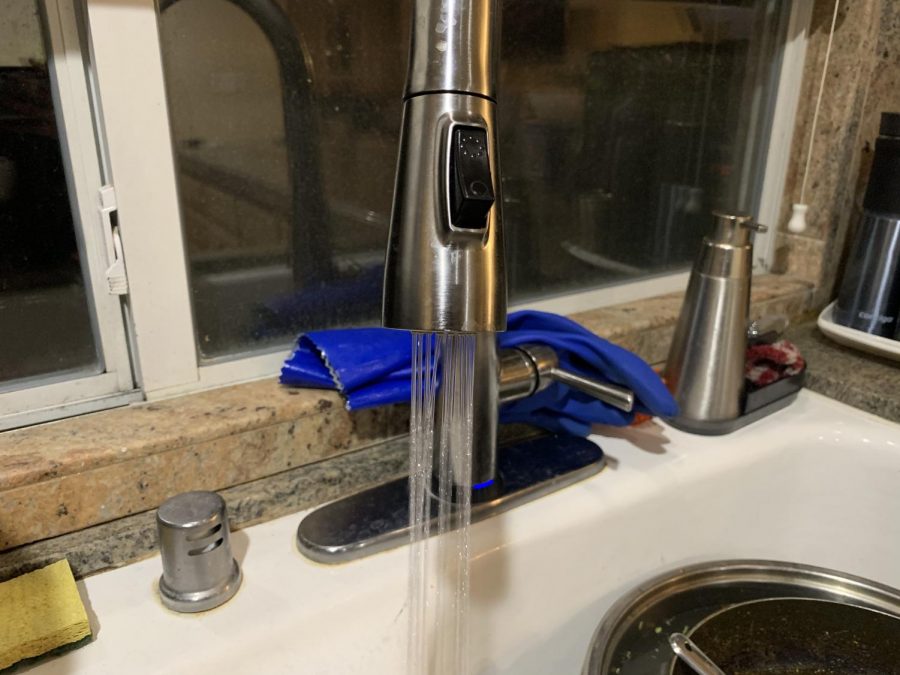April is Earth Month: California needs to focus on water conservation
Don’t forget to turn off the tap after you finish using the sink!
April 16, 2021
In honor of environmental awareness, April has been designated Earth Month. During this month, California needs to take a closer look at how to sustainably use its water supply.
Despite the consistently growing population in California, there is a limited and diminishing water supply as a result of a drought climate, climate change, and unsustainable water use across the state.
“Due to our Mediterranean climate, with seasonal (winter/spring) and low average precipitation, water resources have ‘always,’ been difficult (…) There are many stakeholders needing to share a limited resource and future climate change is only going to make things worse as our climate becomes drier and the Sierras become warmer, said AP Environmental Science and Biology Teacher, Robyn Fewster.
There are a few simple ways that California residents can conserve water in their homes. Slight changes to one’s daily habits can have a big impact on a household’s total water use.
“It’s in the ways that are most obvious to you, aka turning off the tap when you’re washing your face or brushing your teeth or not filling up the sink when you do the dishes. Diet also plays a large part in water conservation (…) Shorter showers, running less cycles of laundry, etc. are all also helpful,” said Go Green Initiative Social Media Manager, Sujana Sridhar (‘21).
While these simple changes can have a dramatic effect on the state’s water use, residents looking to take one extra step can also monitor their lifestyle choices for more sustainable alternatives.
“While individual conservation actions at home are important and I highly encourage them, residential water use is just a fraction of the water used in CA. More important is making informed decisions about our purchases, and the ‘virtual’ water use without realizing it. For example, 2700 L of water is used to produce a cotton T-shirt,” said Fewster.
A more broad solution is implementing environmental consciousness in the form of education reform. Currently, not all California schools teach the importance of water conservation to students from a young age, and educating students can impact entire households.
“I think a sure-fire way to put water conservation on a perennial agenda is to expand it in the education system, especially toward the younger generations (…) Teach students about the dangers of water shortage and how much we take water for granted.” said Local Leaders President, Collin Wang (‘21).
On the topic of solutions, Earth Month was established to celebrate and encourage environmental awareness. However, it is hindered by the fact that it only lasts a month and raises the question of whether residents will continue to be environmentally friendly after April. Additionally, Earth Month can always benefit from more media and public attention.
“It is nice to have a reason to promote specific ideas, but to be honest, I don’t think Earth Day/Month has as big of an effect on people’s behavior, and that is what needs to change. It is important to highlight issues and raise awareness, but I think there needs to be continuous messaging, rather than a one and done and we move on to the next thing,” said Fewster.
As environmental awareness becomes more prevalent, organizations such as the Go Green Initiative also attempt to implement the solutions mentioned previously like educating younger kids and promoting water conservation.
“Go Green Initiative is completely dedicated to promoting environmental stewardship, and a large part of that involves water. This past summer, the Go Green Internship actually focused on water use itself, and the interns were all able to learn about California’s water transport system and other ways we deal with water in day-to-day life,” said Sridhar (‘21).
In a more local example, students at Amador can take classes like AP Environmental Science to better understand the reasons why water is so important. Regardless of how residents choose to be sustainable, one thing is for certain: California needs to focus on water.
“This state is super low on water, and it’s imperative that residents think before they leave on the tap or take a twenty-minute shower,” said Wang (‘21).




